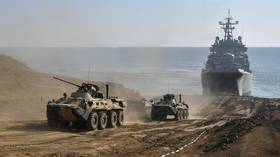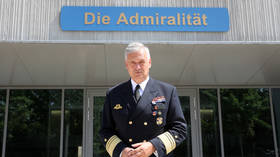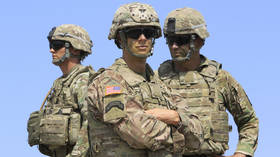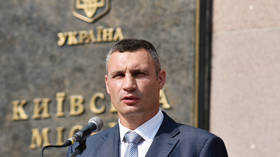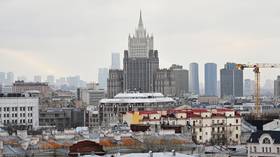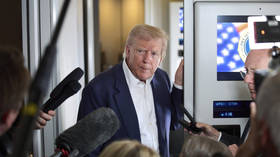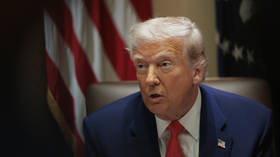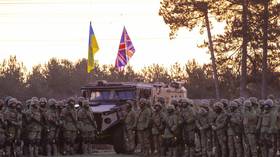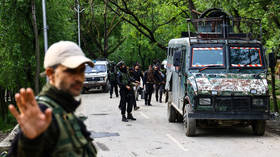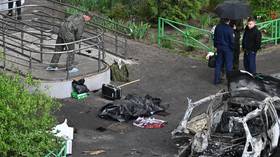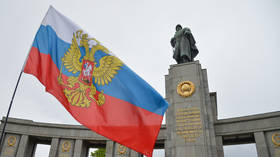From peacemaker to warmonger: Tragic downfall of Ukraine's Volodymyr Zelensky
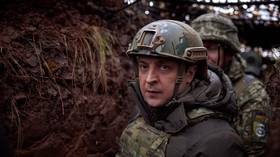
Something truly amazing happened in Ukraine in 2019. A country traditionally split into two practically equal parts almost uniformly chose the same president, casting 73.22% of the votes for famed comedian Volodymyr Zelensky of the Kvartal 95 Studio. By electing the entertainers, the Ukrainian people showed that they were tired of career politicians and, most importantly, wanted peace for the Donbass region.
His predecessor Petro Poroshenko was tied to the civil war in the eastern regions of the country, while showman Zelensky was a fresh face who dropped a few flashy lines, painted a couple of vivid pictures, and was able to convince the people that he was a peacemaker. However, to quote a Ukrainian saying, “it didn’t turn out the way they thought it would.” While in office, the ‘kind clown’ turned into a real-life warmonger who is even tougher than Poroshenko in some respects. How and when did this happen?
An illusion of an alternative
Presidential candidate Zelensky ran his campaign as a spectacular political show, employing his acting skills and the help of his colleagues in the business. “I am not your opponent, I am your sentence,” he said in his professionally trained voice to Poroshenko during a debate, and this line resonated with the deepest aspirations of the Ukrainian people. There he was, a new candidate without any prior experience in politics who promised to prosecute Poroshenko and other corrupt politicians, strip MPs of immunity, and end the war in the Donbass region. His campaign promises inspired the hope that with the old elites gone, the established political practices would be toast as well.
Ukrainians had their reasons to hope that it all would work out well. Zelensky is Jewish, he comes from the traditionally pro-Moscow southeastern Ukraine and speaks Russian as his mother tongue – and so he was perceived as someone who would oppose warmongering, xenophobia, and religious extremism. People thought that he would denounce Poroshenko’s ‘army, language, and faith’ triad. The voters wanted to believe someone, and Zelensky seemed to fit the part.
The legend of Zelensky the peacemaker was also propagated by an interview he gave in January 2019 while he was a still a presidential candidate. When asked what he would say to Russian President Vladimir Putin if it came to it, Zelensky was quick to answer, “First and foremost, I want the shooting to stop.” This line was as important and symbolic as “I am your sentence” thrown at Poroshenko. The voters felt like they didn’t need to hear anything further.
However, later that same month, the ‘peacemaker’ claimed that he was not going to follow through on the Minsk peace plan. “These agreements aren’t very complicated,” Zelensky said and went on to suggest that since the agreements were not working, it was time to bring in other countries into the process. He also refused to pardon people involved in the Donbass fighting, which is part of the Minsk Accords. “They were killing our people. What do you mean? Of course, I won’t do that. I am against anyone dictating us, an independent country, who to pardon. They can’t demand full amnesty. No one will do that!” Zelensky said.
Another promise by Zelensky that won him people’s support in Ukraine was to revise the law ‘On ensuring the functioning of Ukrainian as the state language’, which was adopted by Petro Poroshenko during his last days in the office. “Once I assume the office of the President of Ukraine, this law will be studied and analyzed to make sure it takes care of all the constitutional rights and interests of all citizens of Ukraine. Then, depending on the outcome, I will invoke my powers as the President of Ukraine to act accordingly in the interests of Ukrainian citizens as prescribed by the Constitution.” However, the situation has not changed since then. Ukraine’s official language policies continue to disregard the interests of its Russian-speaking population. In January 2022, further restrictions were introduced requiring all national print media to be published in Ukrainian, which effectively outlawed most of the Russian-language newspapers in the country.
As soon as he assumed office, Zelensky began to sound much more like his predecessor Poroshenko while exploiting the immense nationwide trust and support he’d already won. His Servant of the People party won an early parliamentary election by a simple majority of votes. Under Ukraine’s law, it meant that the president and his allies were free to enjoy power without the need to enter into any political coalition, so the faction could define Ukraine’s policies as they saw fit. On the other hand, this made them ultimately responsible for the situation in the country.
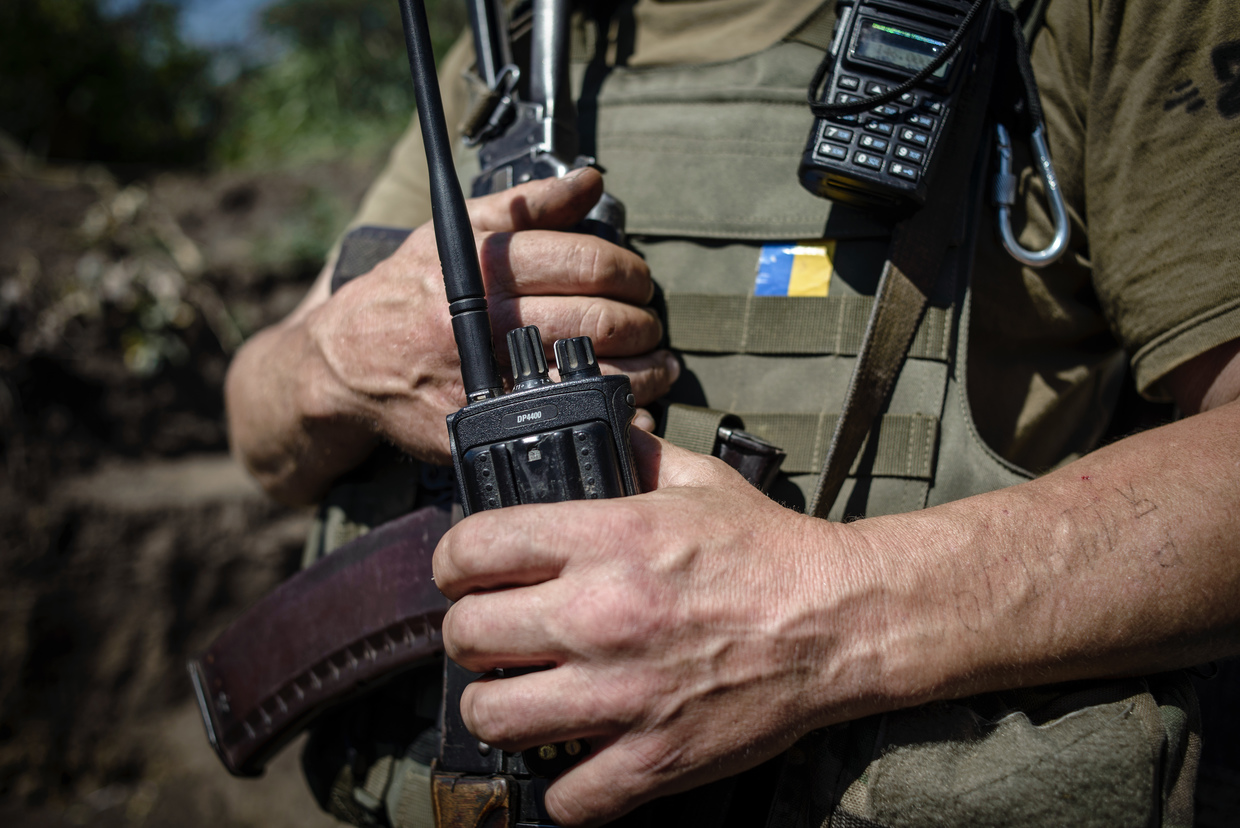
The new Ukrainian leader enjoyed a very cordial reception on the global scene too. Moscow was no exception. Despite Zelensky’s belligerent rhetoric, constant talk about ‘Russian aggression’, demands to return Donbass and Crimea to Ukraine, calls on the NATO countries to exert more pressure on Russia through economic sanctions and other Poroshenko-style statements, the first telephone call between the new Ukrainian president and Vladimir Putin took place as early as in July 2019. It helped put the prisoner exchange process on a faster track. However, this was the last thing Zelensky ever did as a peacemaker.
Zelensky is above Minsk II agreements
The change of power in Ukraine has revived the Normandy Format talks that had been on hold since 2016. In an interview with Germany’s Deutsche Welle in the run-up to the Normandy Four meeting, Zelensky said, “You are well aware that I didn’t sign the Minsk Accords, and neither did anyone on my team. However, we are prepared to take the steps stipulated in the document toward complete fulfillment of all Minsk agreements in order to finally achieve peace.”
Amidst preparations for the Normandy Four summit, the parties returned to the formula proposed by Frank-Walter Steinmeier and adopted back in 2016. The proposal German FM Steinmeier had come up with included Ukraine enacting temporarily the law on special local self-governance regimes in Donetsk and Luhansk regions. It was to come into effect temporarily following the local elections in the said regions and then permanently, once the elections were confirmed to have been fair and free by the OSCE. This course of action was re-confirmed by the parties at the Normandy Format summit of December 9, 2019 in Paris.
But Zelensky did not plan on sticking to the agreement, as it turned out. On October 1, 2019, two months before the summit, Zelensky said, “With any external presence there, no elections will be held. We will never allow elections if there are troops present there. If there are any troops there, you see, any troops at all, there will be no elections.” So in fact, Kiev only signed Steinmeier’s formula as a formality, just to be able to claim the credit for participating in the summit.
Zelensky’s first steps as Ukrainian president should be under scrutiny. It's important to highlight when and how exactly he actually abandoned all plans to settle the conflict in the Donbass. Since the Minsk Accords were signed a long time ago and so much speculation has been generated around them, ordinary people are getting only more and more confused about what is true and what is false in this story, and which actions have violated the agreement and how Zelensky has been sabotaging its implementation.
Let’s start by recapping some facts. The Minsk Accords, endorsed by the UN Security Council Resolution 2022 of February 12, 2015, prescribe a series of steps to be taken in a particular order toward a peaceful settlement of the eight-year-old Donbass issue. According to the document, on day one of the withdrawal [of Ukraine’s troops, since the only other force in the area represents the new self-proclaimed republics] the talks were to begin about holding local elections under the Ukrainian law ‘On interim self-government order in certain areas of the Donetsk and Luhansk regions’. The elections were to be discussed with representatives of the Donetsk and Luhansk People’s Republics (DPR and LPR respectively). The law would also give the regions the right to linguistic self-determination and allow their organs of local self-government to participate in the appointment of heads of public prosecution offices and courts, as well as to create the people’s police units and develop cross-border cooperation with Russia.
Item five of the document requires that pardon and amnesty is ensured, and item six dictates to release and exchange prisoners of war. Reinstating full control of the state border throughout the conflict area by the government of Ukraine is way down the list, under item nine, and is in order only after holding local elections and carrying out a constitutional reform to decentralize the country.
Plain and simple, one would say. And yet, during the joint press conference after the summit, Zelensky said, “We will never agree to federalization of Ukraine by way of amending our Constitution. We will tolerate no external influence on Ukraine’s self-governance. Ukraine is an independent country that chooses its policies independently,” thus basically denying the Minsk II agreements.
Zelensky the ‘peacekeeper’ thus did exactly what Petro Poroshenko was doing, namely changing the order of steps in the document: border control first, elections later. In an interview with the Financial Times, Zelensky also refused to hold talks with the representatives of Donbass saying, “I’m not holding talks with terrorists, this is impossible in my position.” He also went back on the amnesty requirement in his address to parliament in October 2020: “The dreadful word ‘amnesty’ is not about everyone and not about avoiding responsibility. It is about millions of our citizens whose hands are not coated with blood.”
Militarization instead of peace
Immediately after Zelensky was elected, he began traveling around the world in an attempt to get more weapons for Ukraine. He talked to Canada, Germany and the United States, among others. Military aid received by Ukraine from these powers between 2014 and 2021 amounted to US$2.5 billion. Ukraine’s plea for NATO membership has been getting more and more persistent.
Under Zelensky’s rule, militarization of society has been encouraged and military rhetoric got to enjoy massive support. Ukraine’s recently adopted Military Security Strategy calls for combat readiness to actually fight Russia, not only defend itself in case of the need – for example, in case of a border conflict between Russia and its neighbors or if Russia attempts to hold Belarus on its political orbit. Ukraine’s Foreign Policy Strategy is equally ambitious and calls for “fighting Russia” even in Africa.
At the same time, Zelensky’s administration continues to militarize the country much in the same spirit as Albania’s Enver Hoxha. The country’s Defense Ministry has followed up on the law ‘On the fundamentals of national resistance’ by mandating each region and each city with over 900,000 residents to form local defense brigades and setting the total headcount objective for this force at 130,000 people. This force is to be deployed outside combat areas, but the president may give it other assignments.
Women weren’t spared by the decree. The Defense Ministry now wants all women from 18 to 60 on military record until the end of the year, including pregnant women and mothers with many children. Starting from 2023, women who ignore their ‘military duty’, as well as their employers will be slapped with fines. The website of Ukraine’s presidential office has published a petition to reinstate the list of jobs introduced by the Ukrainian government on October 14, 1994. Over 37,000 people have digitally signed it.
Zelensky’s other initiative to grant Ukrainian citizenship to foreign nationals who participated in action against Donbass iquestionable from the standpoint of international law that prohibits the use of mercenaries in armed conflict. It can also create additional risks for Ukraine and its neighbors by legalizing some very questionable individuals, possibly even terrorists who might take their chances of hiding from their crimes under a Ukrainian passport.
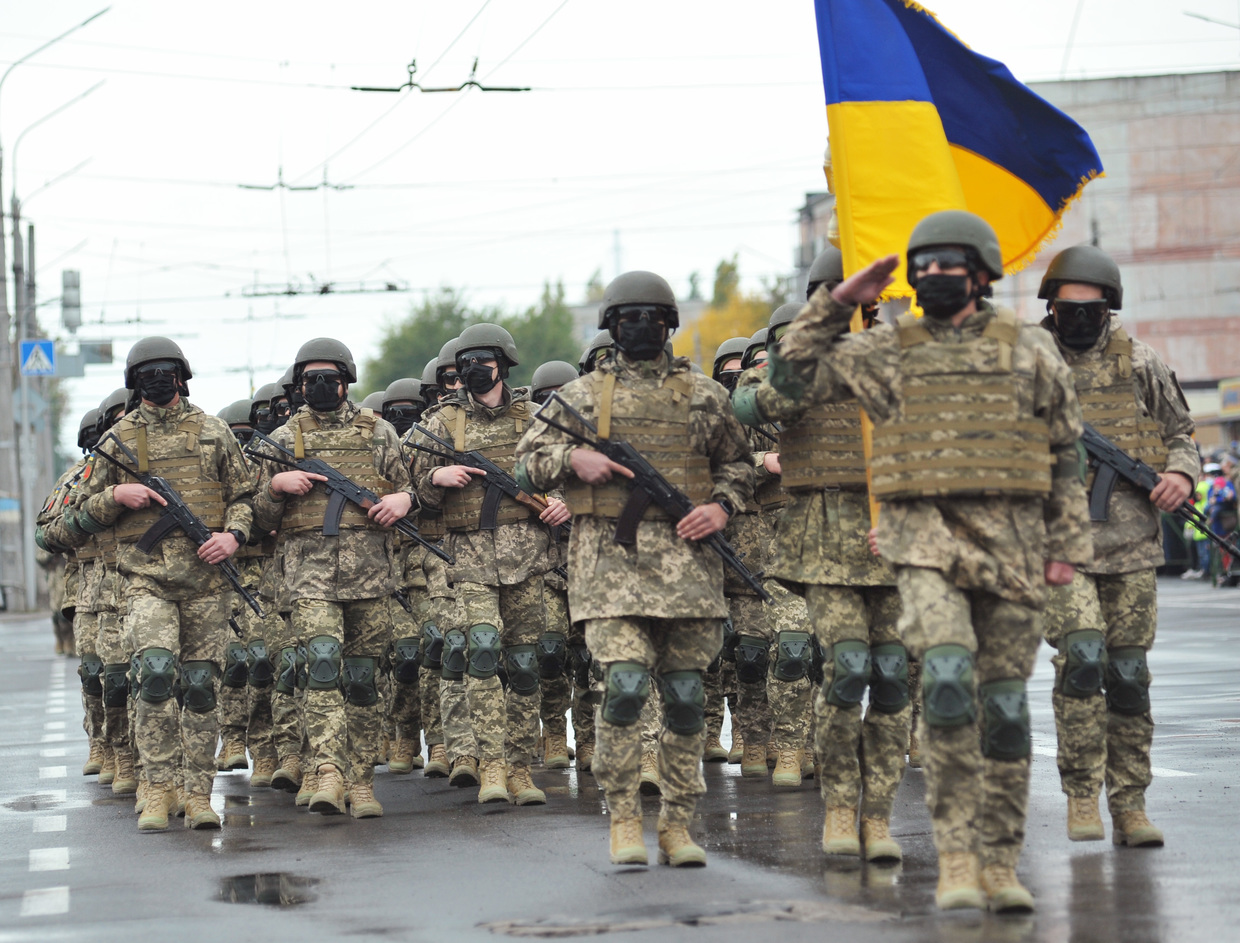
There have been a lot of escalation incidents in Donbass during Zelensky’s presidency. The UN Office of the High Commissioner for Human Rights (OHCHR) reports that the number of ceasefire violations in the conflict zone went up considerably between February 1, 2021 and July 31, 2021, causing the death of 62 civilians. That is 51% more deaths than in the previous six months. The UN has also reported a 369% increase in the number of registered ceasefire violations. From February 1, 2021 to July 31, 2021, the OHCHR registered 27 cases of artillery damage to civil targets, with 22 (81%) of these incidents taking place on the territory controlled by the Donbass fighters and five (19%) on the government-controlled territory. Thus, the Ukrainian forces keep shelling the facilities of the self-proclaimed republics producing the majority of casualties, the UN data says. And let’s not forget that all of this happened before the recent military hysteria and public lamentations about the pending ‘Russian invasion’.
Russia’s Foreign Ministry Spokesperson Maria Zakharova recently said, “the tragic figures [on the contact line in Donbass] have been growing again recently, and it’s a sad fact. After a short break, the average daily number of shelling incidents rose to a higher level compared to the previous month and even the previous year.”
The suffering of the civilian population in Donbass didn’t escape the watchful eye of the OSCE either. During her visit to the Zolotoye-5 settlement in the LPR, coordinator of the Humanitarian Working Group, Charlotta Relander, was shocked by the regular shelling. “It’s very scary to see what I’ve seen here. I didn’t know this was even happening, and this is a large school as I understand. Many, many students here depend on the school to come here to study. And of course, in general, there should not be anything targeting a structure like a school. It’s a civilian structure,” she said.
While the supposed ‘Russian invasion’ and the news of Moscow's troops apparently amassing on the border with Ukraine keep making headlines, no one seems to care to mention Ukraine gathering a force on the border with the rogue regions that is several times bigger than that of the rebels, as has been reported recently by head of the DPR, Denis Pushilin.
Meanwhile, the West keeps pumping weapons into Ukraine. On Tuesday, January 18, 2022, the Ukrainian Army received a batch of light anti-tank missiles. Not only did the White House authorize the Baltic nations to send the US-made anti-tank and air defense systems to Kiev, but it is also going to provide Ukraine with five Mil Mi-17 transport helicopters, according to the Wall Street Journal. A 200-strong spec-ops unit from Canada has been deployed under the pretense of protecting the Canadian embassy. The UK has sent over 30 Special Operations Brigade troops of its own, thus adding to the hundreds of foreign military instructors in Ukraine already training Kiev’s special forces. Among them, reportedly, are some CIA operatives.
The reasons for Zelensky’s transformation
Now let us go back to Zelensky and try to figure out why he missed his chance to bring peace to Ukraine. His talent as an entertainer implies he is good at reading the audience, which is what helped him come to power using the rhetoric of peace, if only to immediately discard it once elected.
To be fair, there were certain attempts to kick off the peace process with the Donbass. Donetsk-born Sergey Sivokho, who served as the adviser to the head of the National Security and Defense Council of Ukraine, set up the National Platform for Reconciliation and Unity. The platform later introduced a bill on the principles of reintegration of the temporarily occupied territories of Ukraine.
Even though the bill went only halfway, dispensing with the full amnesty stipulated by the Minsk Agreements yet giving the Donbass the right to determine their own language policy, it triggered a backlash. Both neo-Nazis and Zelensky’s own faction accused the president of “high treason” and “capitulation,” while Sivokho was assaulted by fighters of the Azov Battalion, which is recognized as a neo-Nazi organization even in the US.
Having no enforcement resources of his own, Zelensky chose to go with the easiest option, since any attempts to negotiate with the self-proclaimed republics incurred the wrath of the extremist groups who have proven they could carry out attacks on the president’s office with impunity.
The pressure exerted by the right-wing radicals has affected Zelensky’s foreign and domestic policy. For example, the president has never kept his promise to revise the discriminatory legislation on language and education. Gabor Stier, a prominent Hungarian political analyst, has pointed out that there were certain problems with protecting the interests of Hungarians in Ukraine, saying that “Zelensky is wary of nationalists, and so he has very little room for maneuver on this domestic issue.”
Meanwhile, forced Ukrainization is not only costing Zelensky support in Ukraine, but also drawing criticism from the international players. As of late December 2021, Zelensky’s approval rating is down from the triumphant heights of 2019 to a mere 24%. Ukraine still hasn’t complied with the PACE resolutions demanding the country’s laws to be brought in line with European standards. It’s true that these laws had been adopted before Zelensky took office, but the law on the indigenous peoples, for example, was penned by his administration.
In December 2019, the Venice Commission published an opinion report criticizing Ukraine’s policies on ethnic minorities and minority languages. The report highlights that “a hierarchy is created at secondary school level, with indigenous peoples potentially treated more favorably than national minorities which speak an official language of the EU, and national minorities which speak an official language of the EU treated more favorably than other national minorities.”
Despite the fact that the Commission believed this to be discriminatory, Ukraine – home to over 130 ethnicities – dubbed only Crimean Tatars, Karaites, and Krymchaks indigenous, ignoring thousands of people that belong to Russian, Polish, Hungarian, Jewish and other large communities.
It might have been his falling approval rating that made Zelensky crack down on the opposition and the media. Through the National Security and Defense Council, he started to close TV channels and introduce sanctions against Ukrainian citizens, including journalists Anatoly Shariy and Igor Guzhva. This didn’t go unnoticed by the UN Human Rights Office, which stated the following in its 32nd report: “OHCHR is concerned that individual sanctions imposed against Parliamentarian Taras Kozak and his eight companies, which led to the closure of television channels 112 Ukraine, ZIK and NewsOne, are not in line with international standards on the right to freedom of expression.” Again, Ukraine paid no heed, introducing sanctions against Shariy and Guzhva, as well as sanctions against a number of media outlets such as Moskovsky Komsomolets, Vedomosti, and Nash TV channel, after the report came out.
The UN also condemned the Ukrainian president’s attack on the rule of law. In the same report, OHCHR said that it “remains concerned about the constitutional crisis caused by the suspension, dismissal and criminal prosecution of two judges of the Constitutional Court, jeopardizing the independence of the judiciary and rule of law in the country.”
The most recent exciting development on that front is the attempt to convict Zelensky’s predecessor Petro Poroshenko of high treason for buying coal from the Donbass region. Since the Ukrainian authorities believe it to be part of Ukraine, where was the crime in that? Is it a crime to purchase coal domestically instead of importing it from South Africa, or is this about Poroshenko’s popularity putting him second to Zelensky?
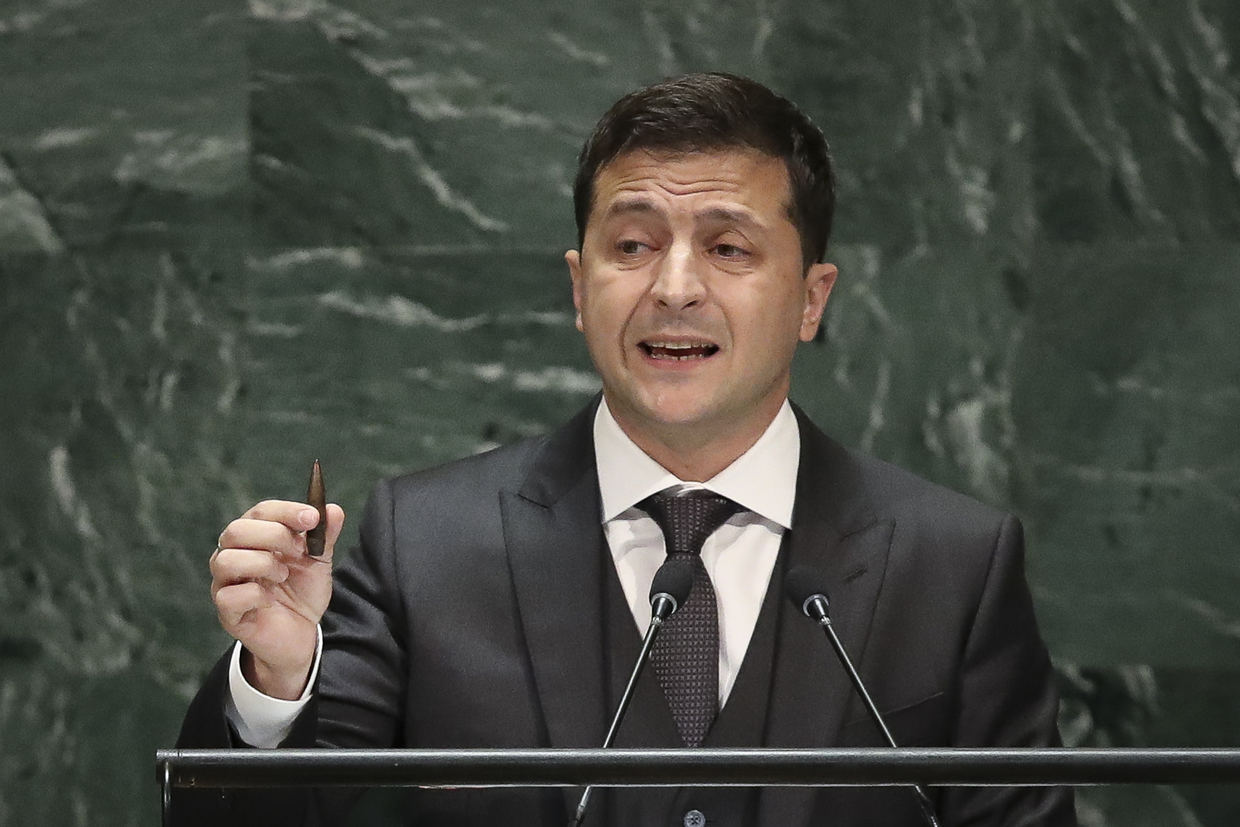
Earlier this year, another Ukrainian opposition leader, Viktor Medvedchuk was placed under arrest, allegedly for committing treason in dealings with Crimea. Just like Poroshenko, Medvedchuk's Opposition Platform – For Life had polled ahead of Zelensky's faction before he was prosecuted.
Medvedchuk has also claimed the case against him is clearly politically motivated.
In August, his lawyer, Rinat Kuzmin, revealed that the politician had filed a petition to the European Court of Human Rights over his right to “a fair trial, and of liberty and personal security.”
So far it looks like Zelensky has been violating democratic norms to stay in power, though it’s unlikely it will help. Let’s look at the recent political history of Ukraine. Viktor Yushchenko, who pursued a similar policy, was elected in 2004 with 51.99% of votes and failed to get reelected in 2010, securing a miserable 5.45%. Poroshenko got 54.7% of votes in 2014 and only 24.45% in the next election. Zelensky’s approval rating now seems to be following the same pattern.
As the phrase attributed to Albert Einstein goes, insanity is doing the same thing over and over and expecting different results. Could it be that the solution for Zelensky actually lies not in stoking the militarist hysteria, but in stopping the war, ensuring the rights of ethnic minorities, finally crushing corruption, establishing the rule of law, and creating a growing economy?
